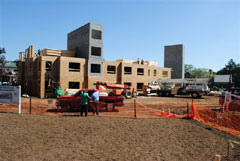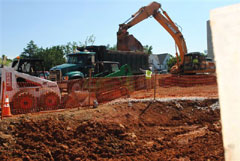 |
Home | Contact Us | A to Z |
 |
July 2010 Region III NewsNews and information from HUD's Regional Office serving Delaware, District of Columbia, Maryland, Pennsylvania, Virginia, West Virginia
July 20, 2010 Dear Friends: HUD is hard at work strategically planning how to service our nation's veterans and others in need of housing and related services. HUD Secretary Shaun Donovan has led the effort to strategically plan the work of the Department for the next five years (FY2010 - FY2015). In this strategic plan, you'll see we're doing our best to transform the way HUD does business and the way we service our customers. In the meantime, HUD and its partners are making this summer...a Recovery Summer. Our partners across the region are seeing their Recovery Act dollars in action as construction crews tackle building affordable housing, improving energy efficiency at public housing units, rehabilitating existing housing and putting sidewalks, ramps, and curb cuts in communities. This work is creating jobs for many across the region and stimulating the local economy. We'll share some of the projects that are in the works across the region. To track local projects and the dollars being spent, visit hud.gov/recovery.
Meanwhile, HUD staff is tallying the numbers for a new scorecard on the nation's housing market. HUD and Treasury just unveiled the first scorecard last week. It incorporates key housing market indicators and highlights the impact of the Administration's efforts to improve the economy. This includes assistance to homeowners through the Federal Housing Administration (FHA) and the Home Affordable Modification Program (HAMP). The scorecard indicates that mortgages are more affordable, more than 6 million homeowners have refinanced and more than 2.5 million families have purchased a home using the First-Time Homebuyer Tax Credit. According to the scorecard, it appears that home prices have leveled off over the past year. Statistics on the number of homeless across the nation show that the numbers of homeless individuals is declining while the numbers of homeless families are on the rise. The ongoing effects of the recession are to blame for the increase in family homelessness. That's the conclusion of the 2009 Annual Homelessness Assessment Report to Congress (http://www.hudhre.info/documents/5thHomelessAssessmentReport.pdf) that was issued earlier this month. On the heels of that report, HUD Secretary Shaun Donovan, who is the chair of the United States Interagency Council on Homelessness (USICH), delivered the nation's first ever comprehensive strategy to prevent and end homelessness to the White House. The full report, titled Opening Doors: Federal Strategy Plan to Prevent and End Homelessness (http://www.usich.gov/) presents strategies to end veterans and chronic homelessness by 2015 and to end homelessness among children, family, and youth by 2020. HUD is also committed to working with the Environmental Protection Agency (EPA) and the Department of Transportation (DOT) to provide more sustainable housing and transportation choices for families. To that end, HUD and DOT issued - for the first time ever - a joint notice of funding availability (NOFA) to announce the availability of up to $75 million in funding. That will consist of $35 million in Transportation Investment Generating Economic Recovery (TIGER) II Planning Grants and $40 million in Community Challenge Planning Grants for localized, innovative planning activities that ultimately lead to projects that integrate transportation, housing and economic development. The long awaited Sustainable Community Regional Planning Grant program NOFA for $100 million in grants has been issued. This program is designed to create stronger, more sustainable communities by connecting housing to jobs, fostering local innovation and building a clean energy economy. For more information visit our website at www.hud.gov/sustainability. Six HUD employees representing various cross program functionalities were recently selected to serve as Regional Sustainability Officers (RSO) for the Sustainable Communities Initiative (SCI):
Michael Torreyson, RSO Carol Payne, RSO Sharon Maclean, RSO Scott P. Smith, RSO Nannette Livadas, RSO RSOs will serve as facilitators with incorporating the six livability principles into every facet of HUD programming as the Department transforms the way business will be conducted going forward. Their roles will primarily be:
Join me in congratulating the team on their designation! So, this summer will be a busy one as the Recovery Act funds are put into action and we continue our work with you our partners to fulfill our shared missions of stimulating the economy, providing affordable housing, building sustainable communities and ending homelessness. We offer our assistance to help communities use HUD resources and/or technical assistance to reach their housing goals. Please feel free to reach out to your local HUD office for information and assistance. Meanwhile we encourage our Recovery Act grantees to use their funds to make a difference in their communities. In this newsletter we feature some of our Recovery Act projects and how recovery dollars are helping people and communities across the region. Brenda Laroche Making a Difference in Region III
Sacred Heart Village is a 78 unit HUD Section 202 project, located in Wilmington, Delaware, that provides a safe and secure environment for low-income seniors and veterans in need of housing. Recovery Act Dollars Help Communities Across The Region
Let's take a look at some of the ways the Recovery Act funding is helping families and communities in the District of Columbia, Pennsylvania and Virginia. The Norfolk Redevelopment and Housing Authority (NRHA) is expanding its employee rolls by 50 positions thanks to a recent infusion of Recovery Act dollars. One of the positions helped to keep a father and his two daughters off the street.
Just a short drive from Philadelphia, Lower Merion community members are enjoying a brand new neighborhood park. Thanks to the Community Development Block Grant Recovery Act funding, Linwood Park is accessible to the disabled. This retreat from the hustle bustle of the urban environment has sidewalks and curb cuts so all can enjoy this peaceful idyllic setting.
We Want to Hear How the Recovery Act Funds Are Helping in Your Community The above Recovery Act section provides a few examples of how Recovery Act dollars are making a difference in so many ways across the Region. We'd love to hear your story or the story of someone you know who has gotten another opportunity or a brand new home thanks to HUD Recovery Act investments. Please share your story.
More News You Can Use Save the Date
Subscribe Today If you would like to receive this newsletter via email when it is published, please sign up by visiting our subscription management page.
|
|||||||||||||||||
| Content Archived: May 7, 2012 | |||||||||||||||||



![[Sacred Heart Village in Wilmington, DE]](hgv-picw-pa-2010-07a.jpg)
![[Photo: Deputy Secretary Ron Sims with partners at Baltimore's Wayland Village Senior Apartments]](hgv-picw-pa-2010-07b.jpg)
![[Loudoun County Emergency Homeless Shelter]](hgv-picw-pa-2010-07c.jpg)
![[Local musicians providing a musical contrast to the rundown Presser Home site at the groundbreaking]](hgv-picw-pa-2010-07d.jpg)
![[Photo: From left to right: Jerry Anderson, Associate DAS of Housing, OAHP; Secretary Shaun Donovan; John E. Hall, Field Office Director/DCFO; and Ted K. Toon, Deputy Secretary of Housing: OAHP]](hgv-picw-pa-2010-07e.jpg)

